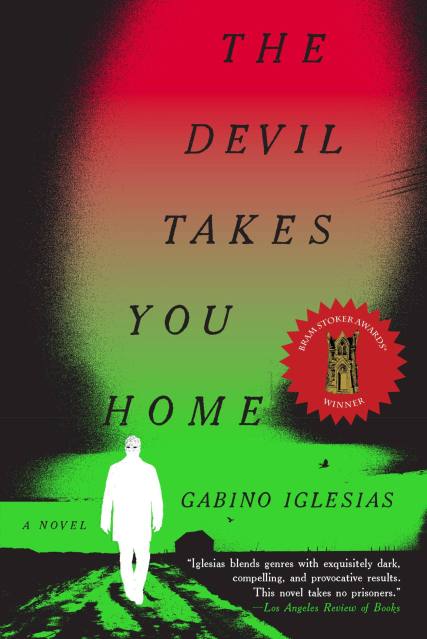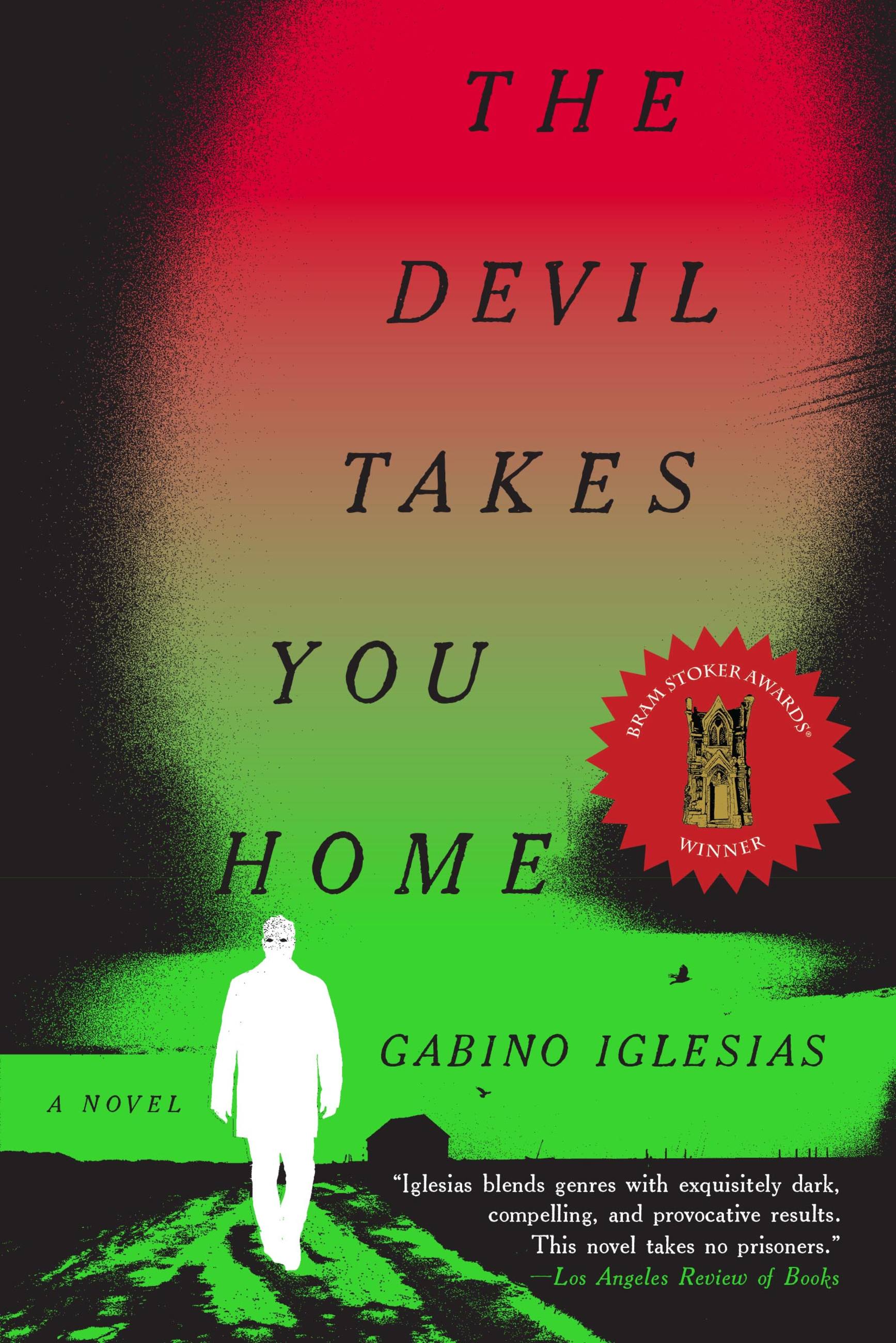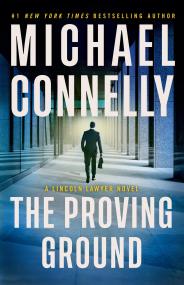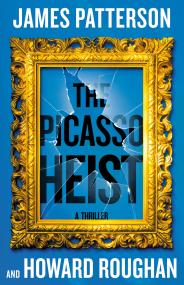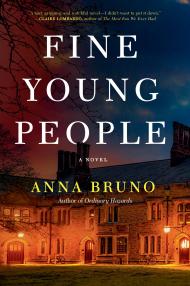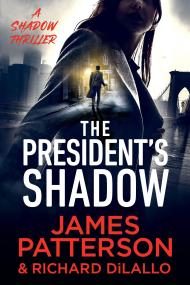By clicking “Accept,” you agree to the use of cookies and similar technologies on your device as set forth in our Cookie Policy and our Privacy Policy. Please note that certain cookies are essential for this website to function properly and do not require user consent to be deployed.
The Devil Takes You Home
A Novel
Contributors
Formats and Prices
- On Sale
- Aug 15, 2023
- Page Count
- 320 pages
- Publisher
- Mulholland Books
- ISBN-13
- 9780316426718
Price
$18.99Price
$24.99 CADFormat
Format:
- Trade Paperback $18.99 $24.99 CAD
- ebook $11.99 $15.99 CAD
- Audiobook Download (Unabridged) $27.99
This item is a preorder. Your payment method will be charged immediately, and the product is expected to ship on or around August 15, 2023. This date is subject to change due to shipping delays beyond our control.
Buy from Other Retailers:
This genre-defying, Shirley Jackson and Bram Stoker award-winning thriller follows a father desperate to salvage what’s left of his family—even if it means a descent into violence.
Buried in debt due to his young daughter’s illness, his marriage at the brink, Mario reluctantly takes a job as a hitman, surprising himself with his proclivity for violence. After tragedy destroys the life he knew, Mario agrees to one final job: hijack a cartel’s cash shipment before it reaches Mexico. Along with an old friend and a cartel-insider named Juanca, Mario sets off on the near-suicidal mission, which will leave him with either a cool $200,000 or a bullet in the skull. But the path to reward or ruin is never as straight as it seems. As the three complicated men travel through the endless landscape of Texas, across the border and back, their hidden motivations are laid bare alongside nightmarish encounters that defy explanation. One thing is certain: even if Mario makes it out alive, he won’t return the same.
The Devil Takes You Home is a panoramic odyssey for fans of S.A. Cosby’s southern noir, Blacktop Wasteland, by way of the boundary-defying storytelling of Stephen Graham Jones and Silvia Moreno-Garcia.
An Edgar Award Finalist • A Bram Stoker Award Winner • A Shirley Jackson Award Winner • A Book of the Month Club Pick • An August Indie Next List Selection • An ABA Indie Bestseller
Genre:
-
"Some nightmares you wake from just leave you in an even worse nightmare. And then Gabino Iglesias holds his hand out from that darkness, takes you home."Stephen Graham Jones, author of THE ONLY GOOD INDIANS
-
"Pure noir, overflowing with the rage and sorrow of our times, The Devil Takes You Home is brutal, hallucinatory, and somehow, beautiful. This novel confirms what some of us already knew: Gabino Iglesias is a fierce, vital voice."Paul Tremblay, bestselling author of SURVIVOR SONG
-
"Vintage noir, with an air of “Heart of Darkness,” played at America’s Southern border, for all the racism and heartache that implies. (Iglesias calls it “barrio noir.”) What you’re not expecting is magic realism (and that bit of horror) paired to pitch-dark crime fiction about cyclical violence."Chicago Tribune
-
"The Devil Takes You Home begins with pain. Like life, it starts with tears. It ends with transcendence. In between we are treated to some of the finest, most terrifying and heartbreaking writing you will read this year. Gabino Iglesias is like one of the old baroque masters, painting hyper-realistic images directly into your brain. Images that will make you cry, make you gasp, and make you see the world in a new light. The Devil Takes You Home is not to be missed.”S.A. Cosby, New York Times-bestselling author of RAZORBLADE TEARS and BLACKTOP WASTELAND
-
“The Devil Takes You Home is carried by a voice and rhythm, shaving sharp and wholly indelible. Iglesias never fails to keep a masterful foot on the pedal, feathering off the gas at times only to inevitably press it to the floor and pin us to our seats.”David Joy, author of WHEN THESE MOUNTAINS BURN
-
“Strap yourself in for this astonishing novel and its hallucinogenic mixture of crime and horror. Unforgettable characters, a pulse-pounding story, and a few scenes that will haunt you until the end of your days. Not since Denis Johnson’s Angels have we seen desperate characters like this, not to mention incandescent prose that is relentlessly brave, urgent, and honest. A page-turner with attitude…don’t miss it.”David Heska Wanbli Weiden, Anthony and Thriller Award-winning author of Winter Counts
-
“A grim rumination on the vacuum of loss, and who we become when we try to fill those gaps. Here there be bloodshed, oh yes, sudden lyrical frenzies peppers over the main course of calamity. Every time you think the book got quiet, it screams again. And note: you’ll never look at bolt cutters or crocodiles the same way again.”Josh Malerman, New York Times-bestselling author of Bird Box and Daphne
-
“Though a young writer, Gabino Iglesias writes with the authority of a writer who’s been down this road many times before. The Devil Takes You Home moves at a lively pace and concerns a man who isn't any better than he ought to be but not a whole lot worse either. In classic noir fashion he becomes involved in messes he ought to have left alone, let others sort it out, but he just can't seem to do that. Iglesias' prose is smooth where smooth is called for and rough or a bit mean when smooth won't work.”Daniel Woodrell, award-winning author of Winter’s Bone
-
“Full of violent truths, The Devil Takes You Home is one of the best books I have read in a long time. An incredible, unforgettable read.”Alma Katsu, author of The Hunger and The Fervor
-
“A ragged-edged bloody bullet-hole of a book — Iglesias has written a dark-hearted tale about the burden of loss, the struggle of poverty, and the long and literal shadow of death.”Chuck Wendig, bestselling author of WANDERERS
-
“Gabino Iglesias is a writer like no other, with a powerful, distinctive, savage voice that transcends genre. In The Devil Takes You Home, he blends elements of noir, thriller, and horror into a brutal and brilliant novel. Brace yourself for the ride—this is his best work yet.”Jennifer Hillier, Thriller Award-winning author of Little Secrets and Jar of Hearts
-
“The Devil Takes You Home inarguably establishes Gabino Iglesias as one of our most innovative, exhilarating, and gifted novelists who, once again, blends genres with exquisitely dark, compelling, and provocative results. This novel takes no prisoners."Daniel A. Olivas, Los Angeles Review of Books
-
"The world of The Devil Takes You Home is harsh and unforgiving, its desert the most treacherous terrain. Iglesias does such a place justice in his brawny, serpentine, and remarkably poignant novel."Thane Tierney, Bookpage
-
“[A] haunting noir thriller…a borderlands odyssey that blends noir and magical realism, meditations on religiosity and human cruelty, and social commentary on guns, the drug trade and resurgent racism.”Simon Romero, The New York Times
-
“This is no ordinary thriller…Scenes of magic, love, family, and faith are contradicted by brutality, violence, racism, and terror. This is a master class in discomfort, a Barrio Noir, and a raw crime story that unapologetically incorporates the ghosts, language, and traditions of the people it honors. It is also a compelling, revenge fantasy with a deadly twist, one that readers will be unable to forget. The violence is brutal and graphic, but the story is also lyrical and staggeringly beautiful. It is an entertaining and thought-provoking book about human truths and the monsters at their core. Suggest to fans of S. A. Cosby and Stephen Graham Jones, who also write stories told by marginalized, sympathetic, and complicated characters in which every detail matters.”Library Journal, STARRED review
-
“Iglesias’s take on the one last job genre is a mediation on grief and rage.”Keziah Weir, Vanity Fair
-
“Riveting…a barrio noir that invites readers to consider the depths of darkness in this world, its material effects, and the cycles of violence we both willingly and perforce enter into…The mix of religious, superstitious, and supernatural elements add a dimension to the novel that heightens its horror, but also its social commentary…The Devil Takes You Home may not be a cheerful book, but it still allows glimpses of love, moments of connection, and glimmers of beauty to exist. Even if those can't save us, they point toward what, with some effort and luck, just might.”Ilana Masad, NPR.org
-
“[THE DEVIL TAKES YOU HOME] cycles between pulse-pounding thriller, diabolical horror, and violent narcoliterature…. Readers captivated by the characters’ motivations and the occult pyrotechnics will quickly devour it whole.”Kirkus Reviews
-
"Iglesias effectively portrays Mario’s fragile mental state and builds a subtle but complex mythology out of chilling details. Readers should be prepared for some intense violence, as well as passages of untranslated Spanish (“Melisa y yo morimos en vida, and that’s the worst kind of death”). Fans of creepy but emotionally deep action novels will be satisfied."Publishers Weekly
-
“If there is one title in this gathering that symbolizes everything that is right with the major publishers’ eagerness to embrace horror in 2022, it is The Devil Takes You Home . . . a barrio noir horror tour de force."Library Journal's Summer Horror Preview
-
“There is nobody who writes quite like Gabino Iglesias. His prose combines lush, gorgeous, poetry with brutal metaphors in ways no other author has quite mastered.”HorrorDNA
-
"There are real scares and supernatural ones, all enveloped in a propulsive, unforgettable journey."Austin American-Statesman
-
“A gory journey through Texas and Mexican border towns. Iglesias describes his fiction as ‘Barrio Noir,’ a genre that combines crime and horror with multiculturalism and political issues. The incongruity of devotion to family with brutal vigilante justice creates dreadful tension as Mario tests his new moral compass.”Becky Meloan, Washington Post
-
"An excellent crime novel driven by righteous grief, fierce narration, and raw violence. Iglesias takes us on a vivid exploration of pain and rage, along the Southwest border where the horrors of reality and the supernatural intertwine."John Woods, author of LADY CHEVY
-
“The line between noir and horror not only gets blurred in Iglesias's The Devil Takes You Home; it gets obliterated. His barrio noir is a new kind of fiction, profoundly moving, despairing and scary all at once.”Brian Evenson, author of LAST DAYS
-
“A brutal journey across America’s southern border and back again, through an underworld in which unearthly powers are used for unsavory purposes (there’s a scene involving bolt cutters that haunts our dreams). It’s a devastating book about cyclical violence, poverty, and love, one that posits that the true test of life in America may ultimately be deciding which devil you sell your soul to.”Emily Hughes, NY Magazine / Vulture
-
“The Devil Takes You Home is an unforgettable neo-noir nightmare written with a poet's heart.”Steve Cavanagh, bestselling author of the Eddie Flynn series
-
"The Devil Takes You Home is a wild ride through grief, faith, loss and monstrosity. Gabino Iglesias's sharp prose and visceral, haunting vision have birthed a riveting novel no reader will soon forget. Fresh and genuinely scary."Tananarive Due, American Book Award-winner author of Ghost Summer and My Soul to Keep, producer of Shudder’s Horror Noire, and UCLA professor of Horror and Afrofuturism
-
"My pick put me through the ringer…It's the story about one man's descent into hell, with violence so relentless I kept grabbing my bookmark to take a break. But I also kept coming back, unable to resist his crisp, propulsive writing…Mario thinks he'll get a new start teaming up with two other men to hijack a drug cartel's cash shipment before it gets to Mexico. Instead, he gets a dark odyssey made even darker, and not necessarily by the beatdowns, shootings, not even that long, terrifying tunnel under the border, but by his own growing realization that he's not as morally bankrupt as he thinks he is."Melissa Gray, senior producer, Weekend Edition, NPR/Weekend Edition Sunday
-
"Tackling everything from border racism to religious extremism and our country’s role in fueling the drug trade, it’s a page-turner that transcends genre. Yet with its blend of horror, noir, and magical realism, the book is also a dread-inducing read tailor-made for the spooky season ahead.”Austin Monthly, Chris Hughes
-
"With a noir voice reminiscent of Jim Thompson, this book charges into rage and despair, sparing no one, least of all the reader. Strap yourself in."Chris Offutt, author of The Killing Hills and Country Dark
-
"an intoxicating story of a man in desperate financial straits who turns himself into a hitman and accepts a highly dangerous contract on a cartel transport operation. The job takes him and two others across Texas and further into an abyss of violence, existential dread, and paranormal happenings”Crimereads
-
"Beautifully written and absolutely devastating, The Devil Takes You Home heralds the ascent of a major crime writer."Crimereads, The Best Novels of the Year
-
"This book really stuck with me. Like, left a dark thumbprint on my soul days afterward. Gabino was always poised for great things and this is roaring proof of that. It's the kind of book I had to read during the day, or with all the lights on. Completely unexpected, uncompromising, and something no one else in the world but Gabino could write."Rob Hart, LitReactor
-
“[A] very effective horror story… make no mistake: the conviction that our world is irredeemable is powerfully rendered here. It’s present in an utterly harrowing set piece that takes place in a shotgun shack in San Antonio, in the pitch-perfect plot twist at the end of the book, and, most viscerally of all, in Mario’s rage against the racism that has disfigured his life—an anger that couldn’t feel more of the moment if it donned a ‘Brown Lives Matter’ T-shirt.”Jeff Salamon, Texas Monthly
-
“A man pushed to the brink takes a decidedly dark Walter White turn in this crime/horror hybrid with a distinctly Mexican flair. By combining a crime story with a Heart of Darkness road trip, Iglesias examines what happens to a man when his lines of morality become increasingly blurred.”The Source Weekly
-
“A compelling genre-bender fueled by unbridled and sometimes righteous wrath... part horror, part crime thriller, pure terror. Iglesias uses a fresh perspective to cast an unflinching eye on social issues, racism, and feelings of Otherness. More ingenious is how the author uses his deeply flawed protagonist to immerse the reader and confront them with social commentary. It’s a bleak thrill ride with no easy answers and no easy outs for any of its characters until its bittersweet end. You don’t want to miss this one, especially with an adaptation currently in the works.”Bloody Disgusting
-
"Both a fast-paced thriller and a nuanced, elegiac tale of a man who’s forever fighting his way through strange, inhospitable lands, whether it’s a country where he’s forever an “other” or a monster-infested underworld. Like his previous books and his many short stories, Iglesias’s new novel is an exercise in navigating the spaces between: between cultures, between languages, between worlds, and between genres."April Snellings, The Big Thrill
-
"The long-awaited new novel from frequent Vol.1 Brooklyn contributor Gabino Iglesias takes the noir genre into some thoroughly unexpected places. Iglesias’s novel traces the last job an unlikely gun for hire agrees to do, and the increasingly bizarre and harrowing array of events that it sends him down when things don’t go according to plan.”Vol. 1 Brooklyn
-
"Iglesias’s newest is chock full of vibrant culture and grisly terror as one man undertakes an odyssey to put an end to his suffering – one way or another. Brimming with noir sensibility and delightfully unapologetic, this book weaves a tangled path of terror that reminds readers there’s no one straight path to redemption.”Rue Morgue
-
"One part road narrative, one part waking nightmare, and one part revelation.”Tobias Carroll, Tor.com
Newsletter Signup
By clicking ‘Sign Up,’ I acknowledge that I have read and agree to Hachette Book Group’s Privacy Policy and Terms of Use
